Study trip to Senegal: OSE Specialized Masters© students at the heart of decarbonization paths
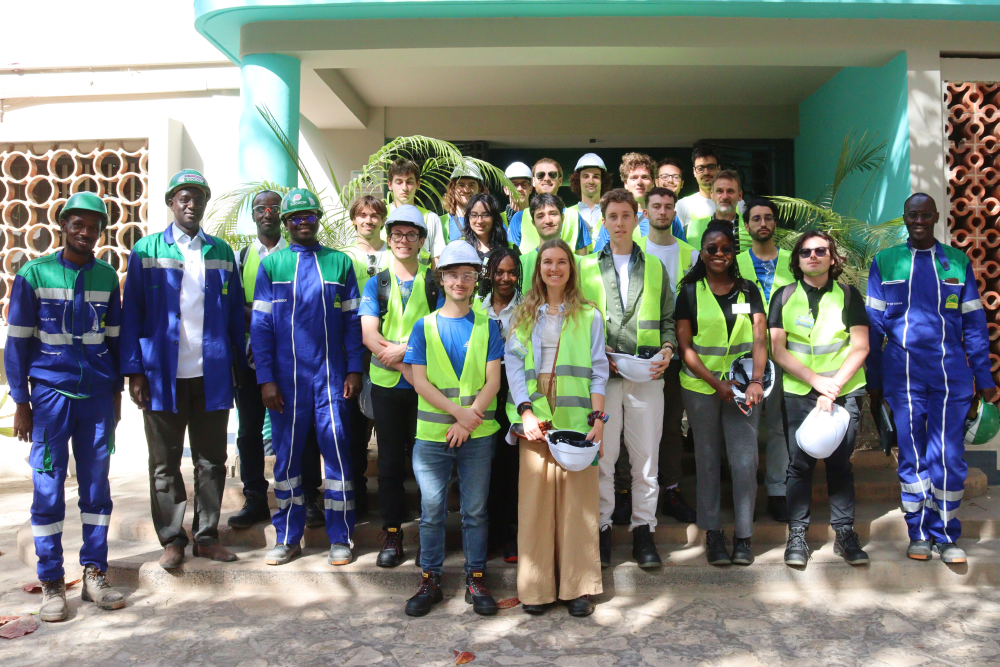

Every year, the Mastère Spécialisé © OSE study trip is a key stage in the program, enabling students to compare their academic knowledge with the realities of the field in an international context. In March 2025, the OSE Class of 2024 took off for Senegal. A country where energy challenges meet the promises of sustainable development.
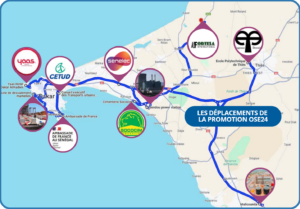
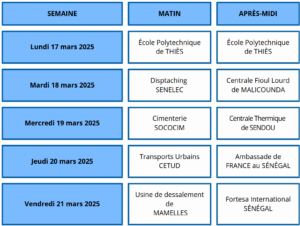
Program for the week’s study trip to Senegal
The trip began with an enriching exchange with the École Polytechnique de Thiès, where the students shared their perspectives on decarbonation with their Senegalese counterparts. They then discovered the EFA’s research laboratories, involved in projects ranging from biogas to typha recovery for eco-efficient buildings. These exchanges laid the foundations for an in-depth understanding of energy challenges in developing countries.
Through these visits, the promotion was able to appreciate just how delicate it is to enable development while promoting renewable energy production, without destabilizing the local, or even national, social and economic fabric. The observations made during this trip will provide food for thought on the subjects addressed at the OSE congress organized for September 23, 2025, and in the book to be written shortly by all the students.
Gilles Guerassimoff, Head of the Specialized Master© OSE
The week continued with visits to major energy sites: SENELEC (historical electricity supplier and distributor), the Malicounda HFO power plant and the Sendou coal-fired power plant. These facilities illustrate the energy transition underway, marked by Senegal’s ambitious “Gas-to-Power” strategy, aimed at gradually converting its thermal power plants to natural gas from offshore GTA fields.
In addition, the SOCOCIM cement plant provided a striking example of heavy industry’s quest for decarbonization, with an energy mix that includes biomass and photovoltaics, and a clear ambition: to reduce emissions while maintaining industrial performance.
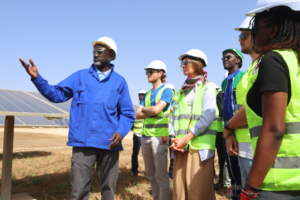
Visit to SOCOCIM Industries to gain a better understanding of the electricity, clinker and cement production processes, through discussions with passionate industry professionals.
Another highlight of the trip was the discovery of Dakar’s Bus Rapid Transit (BRT) project, the first 100% electric bus network in West Africa. Supported by CETUD, this project illustrates Senegal’s advances in clean transport, with modern infrastructure, intelligent control and a future partially solar-powered system.
The study trip to Senegal offered students a systemic vision of the energy transition in an emerging country: dependence on fossil fuels, the challenges of access to electricity, the growing role of renewables, economic, social and technical constraints. The MS OSE students were able to explore all these dimensions in concrete terms, reinforcing their ability to design sustainable, integrated and resilient energy systems.
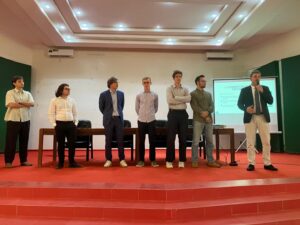
Introducing the students
By immersing themselves at the heart of Senegalese issues, the students enriched their reflections for their future dissertation or the collective projects of the master’s program. Beyond the technical data, it was the human experience, the dialogue with local players and the confrontation with realities on the ground that will leave a lasting mark on this stay. An essential step in the training of future engineers and decision-makers in the global energy transition.
“I think our class trip to Senegal left its mark on us in more ways than one. To begin with, we were lucky enough to receive a warm welcome from the people on site, who were available to answer our questions and enthusiastic about showing us their projects. Our visit to the École Polytechnique de Thiès was a case in point: the day had been set aside for the occasion, so that all first-year students could attend our two conferences! Secondly, in keeping with our school’s motto of “Theory and Practice”, this trip enabled us to put into practice the technical and economic lessons we had learned during our Master’s course. This led to a particularly rich exchange with engineers from Sénélec, Senegal’s national electricity company, where questions about the sector’s development and reform prospects followed one another. Finally, this trip was an opportunity for us to gain a better understanding of the development dynamics of a country undergoing rapid transformation. We were able to gauge the local socio-economic stakes, and in particular the complex trade-offs between decarbonization objectives and development imperatives. The example of the use of liquefied petroleum gas and coal to improve access to electricity and clean cooking methods is a good illustration of the tensions facing the country. This learning is particularly useful for our project, where we have to write a synthesis on this subject. A huge thank you to all the people who welcomed us, as well as those who helped organize this trip.”
Discover the N°203 of Inf’OSE, a special issue detailing the study trip to Senegal by the Class of 2024 of the Mastère spécialisé © OSE.
Do you aspire to become an expert in energy transition through the optimization of energy systems?
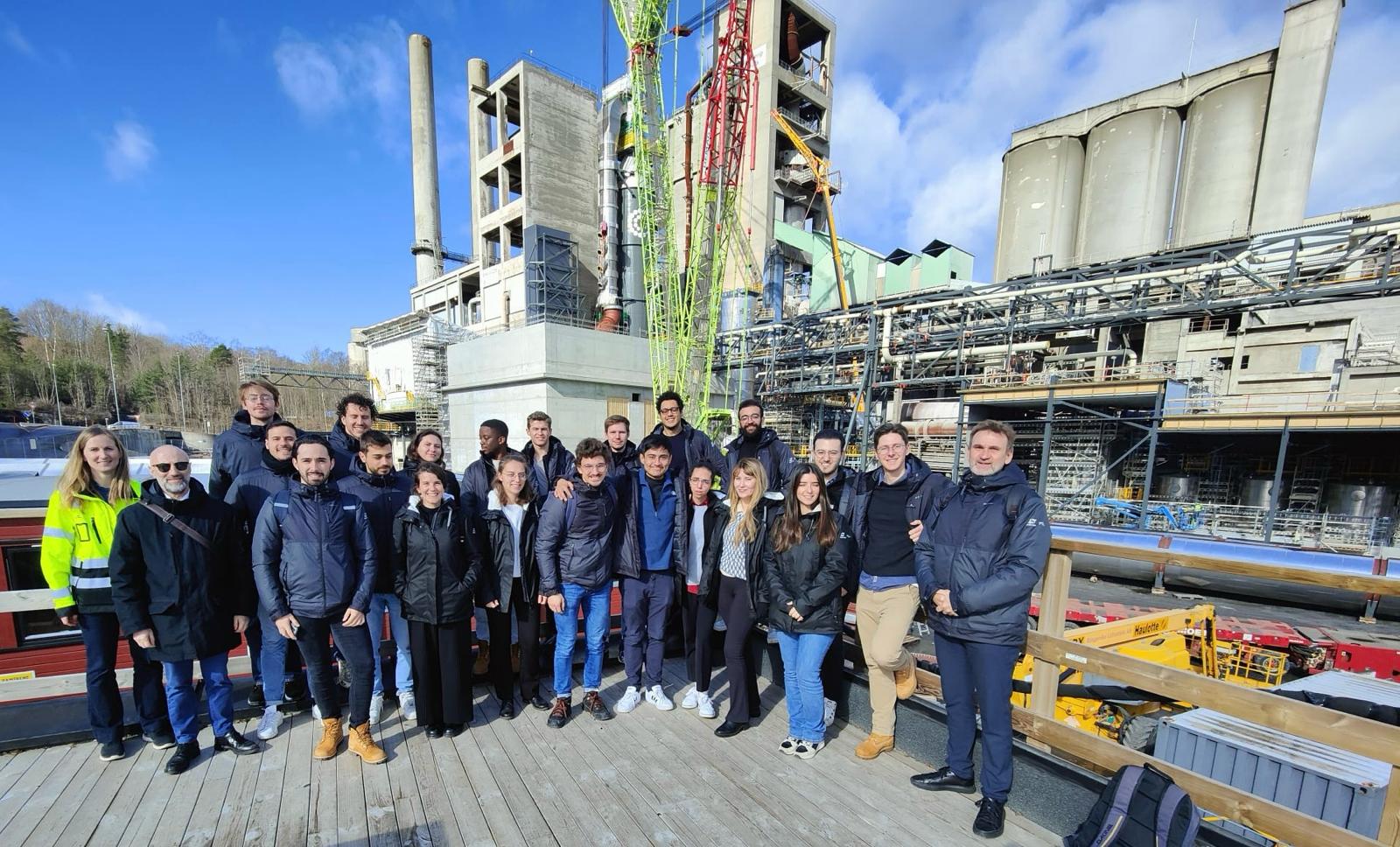
Every year, students in the Specialized Master’s program in Energy Systems Optimization (MS OSE) spend a week abroad, discovering the energy challenge...